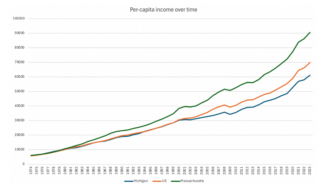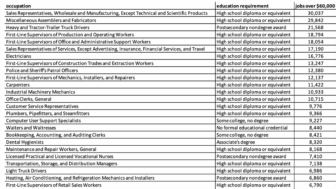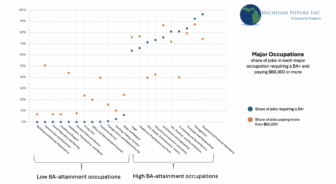
For the first time ever Michigan is a low-prosperity state with a strong domestic auto industry. The recovery from the Great Recession has produced lots of jobs. Which is good news indeed. But in terms of the economic well-being of Michigan households the news is not as good.
From 1929––the year the federal government started calculating per capita income––through 2000 Michigan was a top twenty state every year. 2000 is significant because it is the last year before the current expansion when the domestic auto industry was booming. Today Michigan is 31st in per capita income. More than $5,400 (10 percent) below the national average.
The story is basically the same no matter what measure one uses to measure economic well being. Taking account of Michigan being a relatively low cost of living state improves Michigan’s per capita income ranking to 30th. Michigan ranks 33rd in median household income––another commonly used measure of economic well being. It is hard to look at the data and not conclude that Michigan is now structurally a bottom 20 state in terms of the economic well being of its residents.
Diving deeper into the data we find that the main reasons are that too few Michiganders are working; too many are in jobs with low wages and employer-paid benefits; and too few of us have a four-year degree or more.
- Michigan ranks 38th in the proportion of those 16 and older who work. (Minnesota––the Great Lakes most prosperous state––ranks third. If the same proportion of Michiganders worked as do Minnesotans there would be 725,000 more Michiganders working today.)
- Michigan ranks 33rd in the portion of per capita income that comes from wages and employer-paid benefits. More than $4,100 (13 percent) below the national average.
- Michigan ranks 31st in the proportion of adults with a four-year degree or more. A state’s BA attainment ranking––except for oil and gas states––increasingly aligns with a state’s per capita income ranking. (Michigan is 31st on both measures.)
To restore Michigan to high-prosperity is going to take policymakers tackling these three fundamental shortcomings: not enough of us working; too many working in low-wage/low benefit jobs; and too few of us with college degrees. The start of dealing with these challenges is adoption of a new state economic mission: a rising household income for all. Rather than assuming that a low unemployment rate, a good business-friendly ranking or even strong economic growth will lead to high-prosperity. Michigan has all three now and we are a low-prosperity state.







